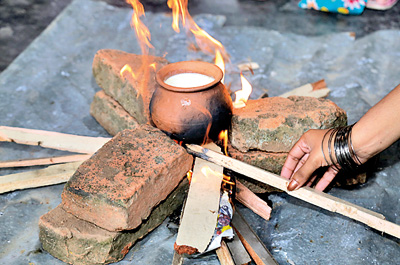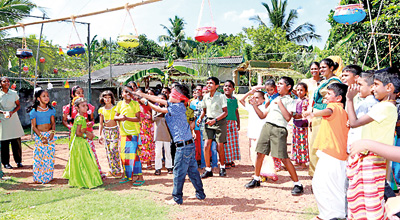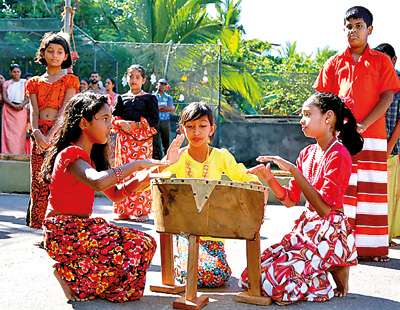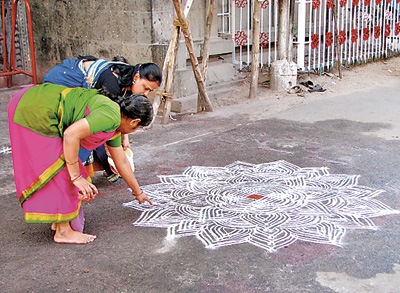Sinhala and Tamil New Year
View(s): Happy Sinhala and Tamil
Happy Sinhala and Tamil
New Year, dear readers of the Funday Times!
This week we’ll be taking a look at some of the rituals and traditions that make this time of year a special one in Sri Lanka.
The Sinhala and Tamil New Year or Avurudu as it is known in Sinhala, is an important national holiday for both the Sinhala Buddhists and the Tamil Hindu communities of Sri Lanka. It is a holiday unique to this island, and brings with it a season of holidays and happy festivities.
We know that Sri Lankans begin celebrating ‘Aluth Avurudu’ or ‘Puththandu’ as it is known to the Tamil community in the month of April, when the Sun makes the move from Meena Rashiya (House of Pisces) to the Mesha Rashiya (House of Aries).
The festival celebrates the reaping of the harvest. After the Maha harvest, the farmers celebrate the occasion giving thanks, making this one of the festivals that is rooted in the agricultural calendar and the customs of those who live off the land.
In the period before Avurudu, families clean up and renovate their homes.
 In villages, the floor, if not cemented, is given a fresh application of cow dung mixed with earth.
In villages, the floor, if not cemented, is given a fresh application of cow dung mixed with earth.
Something that sets Avurudu apart from New Year celebrations in January is that both the ending of the old year and the beginning of the new year are marked separately. Astrologers reveal the auspicious moment one ends and the other begins, but in the middle is a neutral period or nonagathe. In this phase, people avoid work and devote themselves to religious activities.
In Tamil homes during the auspicious time, Maruthu Neer – clean water boiled with various herbs, selected flowers and leaves, milk, saffron and other ingredients are made by the priests in temples. This sacred liquid is then used to anoint the heads of all the members of the family, who must only bathe after it is applied. Many families buy new clothes in the colours recommended by the astrologers. A sweet rice is made if possible with new raw red rice, jaggery, cashew nuts, ghee and plums.
 On Avurudu day, children offer betel to their parents and elders as a symbol of their gratitude, while elders reciprocate with blessings and good wishes. Everyone partakes of the Avurudu feast with its traditional sweets and snacks such as kevum and kokis. Relationships with community are strengthened, relations and friends come to visit and exchange presents.
On Avurudu day, children offer betel to their parents and elders as a symbol of their gratitude, while elders reciprocate with blessings and good wishes. Everyone partakes of the Avurudu feast with its traditional sweets and snacks such as kevum and kokis. Relationships with community are strengthened, relations and friends come to visit and exchange presents.
Kids love the games played during Avurudu. Famous national games are olindakeliya, eluvankeliya, mevarasellama, rabanupatha, buhukeliya, muttigesilla, muthukeliya, onchilivaram and meesellama. Every year across the country, people choose their Avurudu Kumaraya and Kumari. The boy and the girl arrive dressed in clothes that symbolise the dawn of the New Year.
For those doing the cooking at home, astrologers share an auspicious time at which the hearth must be lit to prepare kiribath (milkrice). To invoke blessings, the milk is poured into a new earthen pot and allowed to boil over, symbolising prosperity. The first meal of Avurudu must also be taken at an auspicious time.
 In Tamil homes the house is scrupulously cleaned and sprinkled with saffron water. Intricate, traditional decorations known as ‘Kolam’ are created at the entry to the house with raw white rice flour. A new pot is used to cook the delicious rice treat known as pongal. Lamps are lit and the head of the household arranges the Mangala Kumbam. Tamil families traditionally visit the temple. Offerings are made to the Sun God and Lord Ganesh. These colourful platters usually include a pot with five mango leaves and a coconut, lit incense sticks, a tray of flowers, betel leaves, arecanuts, a bunch of bananas and the sweet rice. A coconut is broken by the head of the household and incense is burnt. Like in Sinhala homes, the elders in the family bless the children, who worship them and seek their blessings and good wishes. Families and friends visit during the day to spread the cheer around.
In Tamil homes the house is scrupulously cleaned and sprinkled with saffron water. Intricate, traditional decorations known as ‘Kolam’ are created at the entry to the house with raw white rice flour. A new pot is used to cook the delicious rice treat known as pongal. Lamps are lit and the head of the household arranges the Mangala Kumbam. Tamil families traditionally visit the temple. Offerings are made to the Sun God and Lord Ganesh. These colourful platters usually include a pot with five mango leaves and a coconut, lit incense sticks, a tray of flowers, betel leaves, arecanuts, a bunch of bananas and the sweet rice. A coconut is broken by the head of the household and incense is burnt. Like in Sinhala homes, the elders in the family bless the children, who worship them and seek their blessings and good wishes. Families and friends visit during the day to spread the cheer around.



